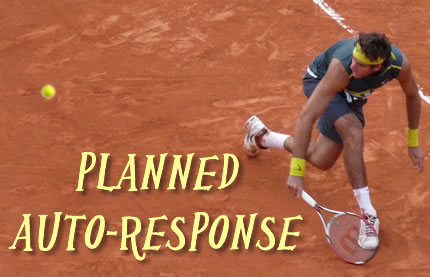
Watching the Summer Olympics in London has been at once exhilarating and fascinating. Whether it is the graceful strength of the gold medal US gymnastic team; the amazing strength of Kayla Harrison as she became the first woman to win a gold for the US; the lightning speed of Jamaica’s Usain Bolt; or the unrivaled achievement of 22 Olympic medals for Michael Phelps, each performance was spectacular and moving. We see these amazing athletes and wonder how they do it; how do they train their bodies to function at such a high level of achievement?
The answer takes me back to a principle I learned as a young athlete, it’s often called muscle memory. I like to refer to it as “planned auto-response.” When children are very young, they seem awkward and clumsy, not because they lack the physical strength or mental capacity to do things, but because their muscles and nerves have not been trained to do anything. Slowly, methodically, they learn to sit up, to crawl, to walk, and to speak. Likewise, a new piano player trips over his fingers and strains haltingly at the notes. He marvels at the seemingly effortless music produced by accomplished performers who have spent years in careful practice. A soccer player who kicks the field goal 1000 times correctly in practice will be able to perform without thinking when the big game comes and she is in a pressure situation.
How does this happen? Repeated actions, practiced over and over again, create neuro-pathways in the brain, nerves and muscles. Over time these neuro-pathways become stronger and virtually bypass your conscious mind to synchronize your senses, brain, nerves, and muscles together like direct links, streamlining a specific task. Thus trained, the body reacts promptly on cue, with perfect accuracy and poise, and without any conscious thought at all.
A fitting example of this principle is found in the game of tennis. The server delivers the ball over the net at high velocity – with speeds reaching as high as 140 mph – and the receiver has only a fraction of a second to respond and successfully hit the ball, keeping it in play. He doesn’t have time to think: “let’s see, that ball is coming pretty fast, it’s veering to the left so I think I’ll take a step in that direction then use a back hand to hit it at a 35 degree angle.” No! By the time your brain went through all of that, the ball would be history and the opponent will have scored a point. The trick is to practice successfully handling serves so many times that your eyes and body work together automatically, without thinking. This is planned auto-response.
Auto-response can work against you as well as for you. The old saying, “practice makes perfect” is only half right. The truth is: practice makes permanent. No amount of practice doing something the wrong way will ever make it any better. Too often, whether because of laziness, time constraints, or lack of proper instruction, we fail to take the time and energy to do things correctly. Repeated over and over, this creates negative auto-responses which are difficult to correct. This is why proper coaching and instruction are so valuable.
This principle of planned auto-response applies to our emotional and intellectual lives as well. If we practice doing a particular task correctly over and over, soon it will become second nature and easier. If you want to become a more optimistic person, for example, you can practice responding positively to situations that come your way. It may take quite a bit of conscious effort at first. But, soon, without even thinking about it, your reactions will be more positive because neuro-pathways in the brain have pre-programmed you to respond that way. You can apply this to anything that you want to change in your life. Just like a financial planner may tell you to automate your savings through automatic bank deposits, so you can automate your own success by putting your brain to work. Give it a try.

We plan, we practice, then we do.
I think this is very true and I’ve always wanted to know how to go about it.
The idea that my brain can be trained to respond just like my body is fascinating and obviously true. This is how we form any habit.
Know how you want to be. Eg: you want to do prayer in the early morning before you intake anything after your bath. Or if you would like to wake up in the early morning before the sunrise and do prayer.
Just plan it. For first few days, just try to wake in the early hours. Don’t break this. After few months when you feel that I am ready to do bath and do prayer. Just go ahead. It becomes your habit.
Or if you want to pray whenever you start any good thing or whenever you eat or sleep. Just practice this for 3 weeks. It will become obvious to you.
Great article! I’ve never thought about it that way, but if I can train my mind to react automatically like I can train my body and reflexes, it could help me to be more successful.